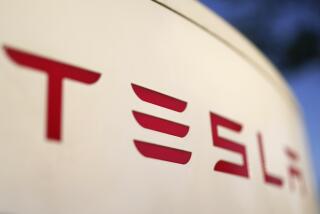GM Urges Judge to Void Injury Award
- Share via
General Motors Corp. has asked a Los Angeles Superior Court judge to set aside a record $4.9-billion jury award to two women and four children who were severely burned when the gas tank of their 1979 Chevrolet Malibu exploded in a rear-end collision.
In court papers, GM lawyers described the largest personal injury award in history as “shocking,” “extraordinary,” and “astonishing.”
After a 10-week trial, a Los Angeles jury on July 9 unanimously awarded Patricia Anderson, her four children and neighbor Jo Tigner $107 million to compensate them for pain and disfigurement. Jurors also awarded $4.8 billion in punitive damages against GM, finding that the auto maker engaged in “despicable” conduct and acted out of fraud or malice.
GM claimed in its appeal papers that the huge verdict was not justified by the evidence or the law. Instead, GM argued, it was “the product of passion and prejudice” on the jury’s part. “Surely GM did nothing to subject it to this astonishing award,” the papers state.
“This shows their arrogance,” said attorney Brian Panish, who represented the burned children. “They continue to deny responsibility. They just don’t get it.”
GM lawyers agreed that tragedy struck the women and children as they returned home from Christmas Eve church services six years ago. But in its court papers, the auto maker denied responsibility for the injuries, instead placing the blame on the drunk driver who plowed into the Malibu’s back end at 50 mph to 70 mph at a stoplight in South-Central Los Angeles.
“This case is, as a human matter, very sad,” said GM’s appeal papers, signed by San Francisco attorney David M. Heilborn. “As a legal matter, it is shocking,” he added. “If this award is not over the line, there is none. It cannot stand.”
GM asked Judge Ernest George Williams to set aside the verdict and decide the case in the company’s favor. As an alternative, GM asked the judge to award no punitive damages. In its appeal papers, GM protested that it was prevented at the trial from telling the jury the other driver was drunk, and from presenting some of the Malibu’s favorable safety test results.
But Panish said he expects the judge to allow the verdict to stand. Although the drunk driver caused the crash, he added, GM’s faulty fuel tank design caused the explosion and burns.
The only injuries from the impact were broken bones, Panish said. The burns came seconds later, as fuel-fed flames erupted beneath the Malibu and engulfed the passenger compartment.
A hearing has been set for Aug. 16. It is the first step in what is likely to be a lengthy appeal.
“Nothing justifies this award,” GM maintained.
Attorneys for the women and children argued that GM risked 300 to 500 lives a year by failing to install a safe fuel system. They claimed at the trial that the gas tank was placed too close to the rear bumper and that better designs moved it over the rear axle or incorporated a rubber shield.
Among their most compelling evidence: A GM analysis showing it cost far less--$2.40 a car--to settle lawsuits than the $8.59 per car it would have cost to fix the problem.
GM maintained that the Malibu’s fuel tank design was safe and met federal standards. Fuel tanks were placed behind the axle in about 95% of the cars sold in the United States during the 1970s, GM asserted in its appeal papers.
Legal experts had predicted that the very size of the award made it vulnerable. Most anticipate that it will be sharply reduced upon appeal.
The plaintiffs and their lawyers have said they will donate half of any money they receive from the case to charity.






